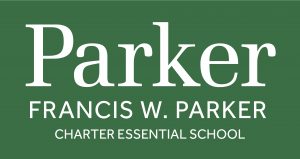
A six-year regional public secondary school of choice, the Francis W. Parker Charter Essential School (Parker) is open by lottery admissions to all residents of Massachusetts in grades seven through twelve. One of Massachusetts' first charter schools, Parker was started in 1995 by area parents and teachers committed to CES principles. Ted and Nancy Sizer were among Parker's founders and the school is part of their legacy; Ted and Nancy served as co-principals at Parker in 1998-1999.
Parker is located on a re-purposed army base thirty miles west of Boston. Four hundred students from forty cities, suburbs, and rural towns in central Massachusetts are enrolled at Parker. Across academic levels, Parker’s curriculum emphasizes practice and progress in the same key skills: Reading, writing, oral presentation, listening, research, artistic expression, Spanish language, mathematical problem-solving and communication, scientific investigation, systems thinking, and technological literacy.
Curriculum at the Parker School integrates the academic disciplines through “Domains”—Arts and Humanities (AH), Mathematics, Science, and Technology (MST); Spanish and Wellness (W).
Students progress through three Divisions: I (roughly seventh and eighth grades), II (roughly ninth and tenth grades), III (roughly eleventh and twelfth grades).
Class groups include a heterogeneous mix of 15 to 30 students whose ages span several years, and who work with one or two faculty members toward mastery of common standards.Over 90% of Parker graduates go on to college.
The Sizer Teachers Center, located at Parker, provides workshops, custom visits, school coaching, and consulting services to educators, schools, and districts. The theory behind the work of the Sizer Teachers Center is that schools involved in reform—whether existing or new schools—benefit most from professional development that is carried out by people engaged in and committed to the same type of work. We believe that our teachers, who are themselves practitioners committed to helping students be successful in school, can effectively provide partnership and facilitation to people in other schools involved in the challenging and sometimes complicated process of change.
New Teachers Collaborative (NTC), which is housed at Parker, offers early career teachers a chance to learn to teach by teaching in small, progressive schools designed to foster the habits and skills of critical thinking, collaborative inquiry, and reflection, where students are known well. NTC is a cohort-based, post-Baccalureate apprenticeship. Grounded in teacher collaboration and reflective practice, NTC is an approved Massachusetts Department of Elementary and Secondary Education teacher preparation program that culminates in initial licensure.
Our school-wide essential question this year is "What Unites Us?"
Each spring, the rising seniors offer two possible EQ's for the following year, and the whole school votes on which it will be. The school-wide EQ serves as a basis for community conversations, advisory activities, public art, and periodic reflection.
Parker's school keeping practices, competencies, and dependable strengths have developed over more than twenty years of highly reflective professional practice. Here are some areas we think of as strengths:
Advisory. Our advisory program is key to knowing students well, building community, developing personal learning plans, and having fun!
Authentic Assessment. Across the curriculum, assessment is integrated into the instruction/practice/demonstrate cycle in ways that increase engagement and support student learning.
Senior Projects. All students complete a year-long senior project and public exhibition as part of their graduation requirements.
Organic World Language. The Spanish domain works to integrate the Organic World Language (OWL) methodology, which facilitates language immersion, risk taking, and Spanish proficiency development.
Teacher Collaboration and Reflective Practice. All teachers engage in daily peer collaboration and regular professional development focusing on evidence of student learning and on-going revision of instructional practice.